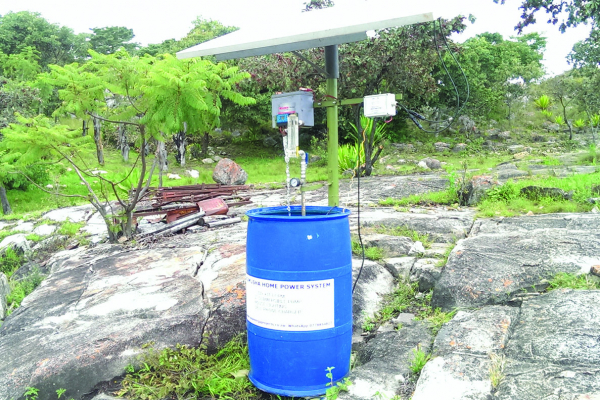
ROBERT Murerwa (35) is a budding communal farmer in rural Nemaire, Manicaland province. His tobacco field is located near a dam, but the state of his crop is not pleasing. The farmer depends on rain despite the availability of the sizeable water body.
BY JAIROS SAUNYAMA
Murerwa prays that if his crop does well, he will use some of the proceeds to purchase some diesel-powered irrigation equipment for the next farming season.
After attending a solar fair held in the area recently, he changed his mind to focus on renewable energy.
“I have a dam around, but I have no irrigation equipment. I was mulling at purchasing a diesel-powered system after selling my tobacco, but I have since changed my mind. I decided to for renewable energy, that is purchasing solar powered equipment, they are affordable and accessible,” he said.
The farmer is one of those who have been attracted by the use of renewable energy as most of them are shifting their mindset to embrace the new technology that can easily be attained in the country.
Recently, companies that deal with renewable energy equipment held two solar fairs in Makoni and Mutasa districts in a move meant to intensify awareness campaigns to farmers, so as to improve their livelihoods.
Some of the exhibiting companies offered credit facilities to the farmers. Gadgets on exhibition included solar pumps, solar powered sprinklers, solar cookers and solar-powered home television sets.
- Chamisa under fire over US$120K donation
- Mavhunga puts DeMbare into Chibuku quarterfinals
- Pension funds bet on Cabora Bassa oilfields
- Councils defy govt fire tender directive
Keep Reading
The solar fair was a part of energy marketing activation work being implemented by Practical Action using funds that it won, when it was awarded the Al Zayed Future Energy Prize in recognition of its global contribution to renewable energy and sustainability.
Practical Action Energy advocacy officer, Chiedza Mazaiwana, said it is high time the rural communities embrace renewable energy for the better of their lives and that they should capitalise on the latest business models such as the PAYG, which enable households to make a deposit, take home the equipment, and then pay it off over an agreed period of time.
She urged the government to educate consumers on the renewable energy system.
“People do not have to continue living in energy poverty. Things have changed, technological advancement allows for them to choose sustainable solutions that meet their energy needs at affordable prices. Distributed renewable energy is available now, it is the fastest, cheapest and most sustainable way to reach communities and enable access to energy,” Mazaiwana said.
In December last year, the government announced that it was targeting 1 000MW of renewable energy in the country by 2025 although the use if biogas, solar, thermal and wind. The country has also made a commitment to cut carbon emissions by 33% come 2030.
According to a 2013 Zimstats survey, only 19% of rural population has access to electricity. Firewood is the mainly used at 61%, coal (8%) and liquid fuels like paraffin (18%).
According to the World Energy Outlook 2000, Zimbabwe has a national electrification rate of 79% of urban households, rural electrification is still below 19%, and only 32% of the population has access to modern energy.
Renewable Energy Association of Zimbabwe (REAZ) chairman, Isaiah Nyakusendwa said the rural community is slowly accepting the use of clean energy and added that it is high time people improve their livelihoods.
“As an association, we are here to represent players in the market, who supply renewable energy products. Our concern is basically to make sure that we have quality products. We are saying it is also important for farmers to have products that they can invest in. They can have quality livelihoods, for example we have a farmer with a tobacco field near the dam, but is using cans to water the crop, why not using a pump and water using solar. We have plentiful solar, we have plenty of water, there is a whole lot of things that we can do to improve the livelihoods of the communities,” he said.
Practical Action emphasised the need for quality products, in particular those in line with lighting global minimum quality standards. This is because poor quality products gets easily damaged, and undermine consumer confidence in the technology.
One of the successful renewable projects in Zimbabwe is found in Gwanda.The Mashaba Mini Solar Grid was established under the Sustainable Energy For Rural Communities project being funded by the European Union (EU) with additional support from OPEC Fund for International Development (OFID), United Nations GEF Small Grants Programme, Hivos, Jersey Overseas Aid Commission and others.
The project is erecting solar-powered decentralised mini-grids in isolated rural communities in Zimbabwe and Malawi.
The recently completed Gwanda solar mini grid has 400 solar panels with each generating 255 watts of power while at peak. This means that the project is generating 99kw after losses through transmission and is servicing a 40km radius through a 33kv power line.
Currently, the solar power is institutionalised with Mashaba Primary School, clinic, business centre and Rustler Gorge Irrigation scheme being the ones connected.
Speaking on the sidelines of the solar fair held in Manicaland recently, acting provincial energy officer for Manicaland and Masvingo Stanley Mukora said government is promoting the use of renewable energy especially solar.
“Solar energy is available, and it is our mandate to promote the use of renewable energy. We are saying, let the people be made aware, this is an option that government is pushing and willing to support. It is very sustainable and accessible to people in the communities. The excitement is there. There is need for more awareness campaigns in the communities,” he said.











